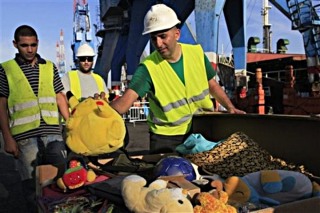Days after Israel’s first announcement to that effect turned out to be a fiction, the Israeli cabinet has now voted on what officials are calling a general aim to ease the entry of humanitarian aid into the Gaza Strip, though only through officially approved Israeli border crossings.
 The latest statement says that Israel will soon release a revised list of “banned” goods for the Gaza Strip, things which Israel will not under any circumstances allow to enter the strip through either its crossings or by way of Egypt, which cooperates with the Israeli blockade. The list is said to be a considerable “liberalization” over the old list, and will remove in whole or in part, the ban on certain foods, like chocolate and spread margarine, which Israel considered too much of a “luxury” to permit in the tiny enclave. Toys and pencils, two other long banned categories of goods, are also said to be allowed.
The latest statement says that Israel will soon release a revised list of “banned” goods for the Gaza Strip, things which Israel will not under any circumstances allow to enter the strip through either its crossings or by way of Egypt, which cooperates with the Israeli blockade. The list is said to be a considerable “liberalization” over the old list, and will remove in whole or in part, the ban on certain foods, like chocolate and spread margarine, which Israel considered too much of a “luxury” to permit in the tiny enclave. Toys and pencils, two other long banned categories of goods, are also said to be allowed.
On the other hand the Israeli government maintains that it will continue its ban not only on weapons but on “dual use” goods, which could mean that one of the most desperately needed goods, cement to repair the damage from the January 2009 Israeli invasion, may continue to be banned or severely restricted.
Israel has also used the term “dual use” broadly to restrict other goods in the past. At one point the Israeli military placed a 100% ban on all importation of shoes and clothing to the strip for years based on the argument that any clothing might be used as part of a military uniform and therefore could be classified as “dual use.”
The revision comes amid growing international outrage over the humanitarian crisis caused by the Israeli blockade, and growing attention after the Israeli Navy attacked a boat carrying humanitarian goods to the Gaza Strip, killing nine aid workers.





The blockade is illegal according to international law.
Israel committed piracy and murder on the high seas.
All the rest is playing the Israelis' game.
Let the Israelis keep talking all they want.
Only imbeciles are listening.
And their apologist audience of American neocons and the "others" that have been drinking their cool aid….
Ruth Wedgwood, Johns Hopkins professor of International law, has stated that Israel's use of deadly force against the flotilla in international waters was indeed legal.
Only imbeciles don't listen.
"'There will be no civilian closure of Gaza but there will be a security closure,' Prime Minister Benjamin Netanyahu said after the meeting. 'That security closure will be tightened from now on.' He added: 'We have deprived Hamas of the ability to blame Israel for hurting the civilian population [of Gaza] and our friends around the world are getting behind our decision and giving international legitimacy to the security blockade on Hamas.'"
Haaretz June 20 2010
Notice the concern for international recognition of the "legitimacy" of the blockade.
"Security closure" is also a chuckle–Netanyahu and his PR consultants must have spent almost as much time on that as upon the Lover Boat / Hate Boat dichotomy that they flooded the media with just after their piracy and murder on the high seas.
It almost ranks up there with "existential threat".
Also check out the photo of Netanyahu that is with the Haaretz article:
http://www.haaretz.com/polopoly_fs/1.296075.12765…
Beginning to realize the enormity of his imbecility and incompetence perhaps? Theseat looks a litle hot. Or is it hemorrhoids?
No doubt Barack is itching to take over–but in fact both of them are in the crosshairs.
We need to ban the export of US $ and military goods to terrorist israel.